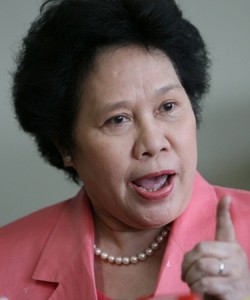Miriam Santiago wins seat in international court
Senator Miriam Defensor-Santiago is the newest judge of the International Criminal Court (ICC), the first Filipino and first Asian from a developing country to sit in the tribunal that tries cases of genocide, war crimes, and crimes against humanity, the Department of Foreign Affairs (DFA) announced Tuesday.
The DFA, citing a report from the Philippine Permanent Mission to the United Nations in New York, said Santiago was “overwhelmingly elected” in elections held by the Assembly of States Parties on December 12 in New York.
After waging a four-month campaign, Santiago topped the first round of polling, making it to the court with 79 votes out of 104 votes cast, an indication of strong support for her from the states parties, the DFA said.
Santiago said she would eventually resign from the Senate but that this would probably not happen in the next six months.
“I will take my oath of office in March together with six other new judges. They are still in the process of being voted upon. The Philippines was No. 1 in the first round of voting so that is something for the Philippines. All six of us cannot assume office until we are officially called to report for work,” she said.
Santiago will serve a nine-year term.
For now, the senator said she still expected to play an active role as a trial judge in the impeachment case against Chief Justice Renato Corona.
The feisty Santiago is also the author and cosponsor of the controversial reproductive health bill in the Senate.
She thanked President Benigno Aquino III for nominating her to the ICC and Foreign Secretary Albert del Rosario, “who maximized his unerring generalship over all Philippine posts abroad” in a lobby effort for her.
She also cited Foreign Undersecretary Rafael Seguis for being her “campaign manager” and Ambassador Libran N. Cabactulan, Philippine Permanent Representative to the United Nations, who “network(ed) with the UN ambassadors.”
The ICC has 120 states parties and was established by a treaty called the Rome Statute that gives it power to try and punish the “most serious violations of human rights, in cases when international justice systems fail.”
Influential states
To be elected, candidates must receive two-thirds of the total votes cast, with the majority of the states parties voting.
The senator recalled that former President Gloria Macapagal-Arroyo had nominated her to the UN International Court of Justice, but while she won in the General Assembly vote, she lost in the Security Council.
For this, Santiago blamed several influential states, including the United States for her stand against the Visiting Forces Agreement; China, because of her close friendship with the Dalai Lama; and Japan, because of her efforts to amend certain provisions of the Japan-Philippine Economic Partnership Agreement favoring Philippine nurses.
According to the DFA, Santiago was the first to be elected among 18 candidates vying for six seats on the court. In the first round of voting, she bested candidates from every region of the world.
The DFA noted that during the four-month campaign and run-up to the elections, Santiago was able to win the support of the states parties with her preeminent expertise in international law and outstanding experience as a trial court judge.
Tremendous responsibility
“This is the message that we emphasized in the campaign. We are pleased the international community has listened to us. Indeed, it is a new day for the Philippines, a day of pride for our country and a day of honor, knowing that this is a tremendous responsibility and mandate placed upon our compatriot,” Del Rosario said.
In a statement, Ambassador Cabactulan said Santiago’s triumph “is a victory for the entire Philippines and a demonstration of the international community’s complete faith and confidence in her outstanding abilities and of the country’s commitment to the global fight against impunity.”
During the campaign, Santiago emphasized the unique perspective she could give as a female judge, pointing out that many crimes of impunity were directed at women and that many complainants were women, the DFA noted.
Santiago had said in October that if she got the position, she would have to leave the Senate to take her seat in The Hague, The Netherlands. An ICC information note, however, clarified that court proceedings could take place anywhere in the world. With Maila Ager, INQUIRER.net
Originally posted: 9:07 am | Tuesday, December 13th, 2011
